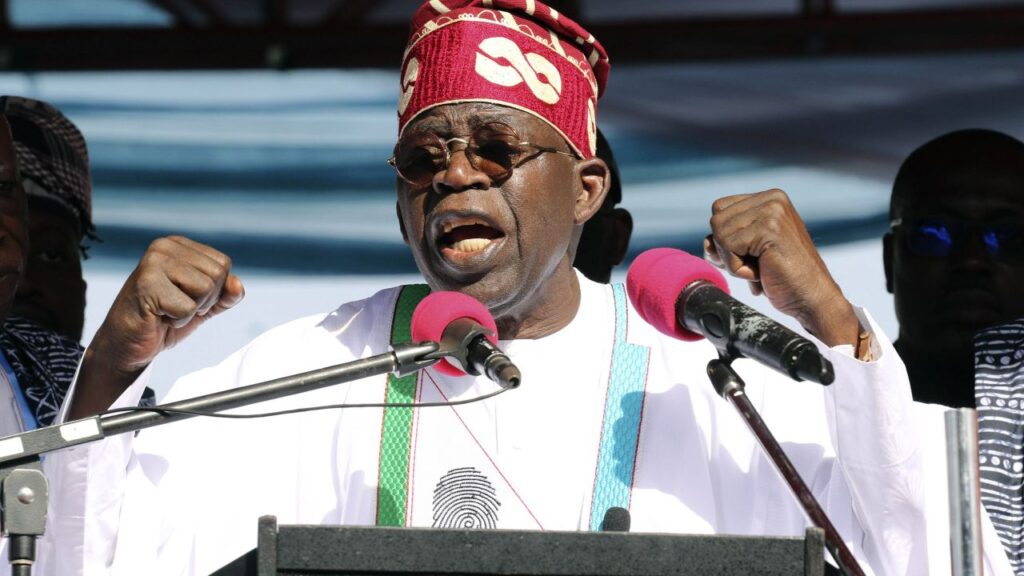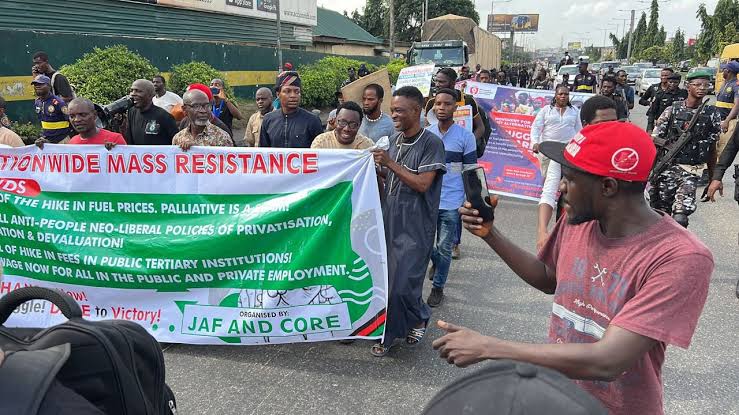The people have announced that there will be a nationwide protest starting from August 1 – 10 as they seek to end the bad governance and hunger in Nigeria.
Nigeria has taken a new shape since President Bola Ahmed Tinubu (PBAT) came into power on May 29, 2023, and according to the people, not every shape can be seen as good.
The President, having vowed to protect the interests and desires of the people in his manifesto, received the mandate from former president Muhammadu Buhari and promised to continue to lead Nigeria to greater heights.

Although PBAT has shown good values and policies that will help bring the country back on its feet and make us the “African Giant” once again, there have been a few hiccups along the line as he passed his judgements and enforced new policies on the people.
Here are possible reasons why the people are protesting against the bad governance in the country.
- Removal of fuel subsidy
Upon entering power in 2023, the President’s first agenda was to abolish the need to pay fuel subsidies in the nation, letting Nigerians bear the brunt of the petrol they purchased at the initial price without the government paying for them. When the government announced that it was seizing its payment of petrol imported into the country, the Organised Labour spoke up, lamenting about how the economy skyrocketed in the country after the announcement of the fuel subsidy. The Organised Labour, comprising of the NLC and TUC, announced that they would be going on strike to protest the fuel subsidy and the rising cost of living.
- Cost of living
2024 has been a challenging year for every Nigerian who is not a part of the top 1% (wealthy millionaires and billionaires), as everyone else is left to fend for themselves amidst the hardship and rising cost of living in the country. The market price for food has increased drastically compared to the previous years, as the National Bureau of Statistics (NBS) revealed that food inflation has risen by 61% within a year. The people cannot afford the luxury of various meals as they were once able to two years ago, and they have complained to the government about the policies and their continuous adverse effects on them.
- Floating the naira
In 2023, under Tinubu’s administration, the Central Bank of Nigeria (CBN) floated the country’s currency, the Naira, against the US dollar in a move to ensure the stability of both currencies in the foreign exchange market; however, this did not go as planned. The floating of the naira was the government’s process of allowing the value of the naira to be determined by the demand and supply in the foreign exchange market. Since the floating, the US dollar has risen exponentially against the naira, worsening the value of the naira in the foreign exchange market. For the first time in history, the US dollar sold at over ₦1,000 in the foreign exchange official market and even closed up to nearly ₦2,000 (it currently sells at ₦1,611/$). The wide gap between these currencies, along with other foreign currencies against the naira, has left a significant mark on the economy.
- The exit of multinational pharmaceutical companies
The country’s healthcare also took a hit as the floating of the naira proved dangerous to their finances. Many large industries and companies in Nigeria lost a lot of investments, most especially the multinational pharmaceutical companies. These companies include GlaxoSmithKline, Sanofi Nigeria Limited, and many more, all announced that they would no longer be able to function in Nigeria, exiting the country and leaving the people to fend for themselves when healthcare matters came up. Drugs and medications became more expensive, and the government had to enforce a tax-free law for all medicine imports.
- Increased transportation fares
Since the announcement of the fuel subsidy removal, Nigerians have found it hard to move around the country as transportation fares have also been hiked. With petrol being sold at the rate of ₦550-₦610 per litre, the transportation sector had to find a way to balance the scales by increasing the fares for each trip. This was one of the reasons why the NLC and the TUC staged a protest in 2023 before the FG announced a slash on transport fares for all government-owned vehicles.
- Minimum wage
Until July 29, 2024, the minimum wage in Nigeria was ₦33,000. Since the tragic rise in the cost of living in the country, it was evident that the minimum wage would no longer be able to meet the people’s needs, which is why Organised Labour took to the streets to protest against the unfairness of the government’s policies, demanding that the minimum wage be increased to ₦250,000 before settling for ₦70,000.
- The government officials, the bourgeoisie and the proletariat
There is a striking difference between the lives of the government officials, the bourgeoisie and the proletariat. The people have complained time and time again about how the FG continues to give willingly to government officials, providing the latest 2023 SUVs to 107 Senators in the country despite the hardship being faced by the people in the country. The people have been forced to forego their once luscious and lavish life and have embraced a life of suffering and repetition as they can no longer afford the littlest things they desire. In contrast, the bourgeoisie and government officials such as the Nigerian Bar Association (NBA) continue to demand a raise in their salary.
- Bribery and corruption
According to the National Bureau of Statistics (NBS), public officials received a total of ₦721 billion in bribes in 2023 alone. Nigerians have become fed up with the administration and seek to end the bad governance in the country. Therefore, with their voice, they intend to speak to the President, hoping he would listen to their pleas and focus more on building a safe and comfortable world for them. Along with the bribery and corruption in the country, there have also been several unanswered crimes allegedly perpetrated by the paramilitary forces, which has left the people in a constant state of distrust of the paramilitary.
- The increase in tertiary institutions’ fees
The tertiary institutions in Nigeria were not safe from the policies made in Nigeria as the federal government revealed a method that it believed would help students pay their school bills. The FG introduced student loan schemes to the public, leaving universities to increase their tuition fees more than an average student could afford. Some students have found it challenging to stay in school and continue to pay their fees as they are wary about student loans. Many schools have been forced to shut down due to the rising number of students protesting the increment of school fees.


Leave a replyComments